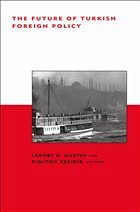Turkish foreign policy and its implications for Eurasian security.
Since the end of the Cold War, Turkey has moved from the periphery to occupy the very center of Eurasian security. It is a critical participant in NATO and aspires to become a member of the European Union. The pivotal role that Turkey plays in Southeastern Europe, the Middle East, and the Caucasus has profound implications for the international arena and spawns vital debates over the directions of Turkish foreign policy.
The Future of Turkish Foreign Policy explores these debates and the interactions between Turkey's domestic and foreign policies at the beginning of the twenty-first century. Contributors to the book include some of the foremost scholars and exponents of Turkish foreign policy. Their analyses reveal the complexity of the challenges that confront Turkey's foreign policy and suggest creative and resourceful strategies for resolving its policy dilemmas.
Review text:
'The Future of Turkish Foreign Policy thoughtfully and comprehensively introduces its readers to the challenges facing Turkey in Europe, the Middle East, and Central Asia in all their subtlety and complexity. Some of the most distinguished analysts and commentators from Turkey, Europe, and the United States have contributed to this unique presentation of the contending worldviews within Turkey's decision-making elite and their foreign policy implications. The book's in-depth insights into Turkey's critical role in regional affairs are especially valuable for scholars and diplomats alike.'
--Ismail Cem, former Foreign Minister of Turkey (1997-2002)
'This is a timely and coherent volume. Insightful arguments advanced by the authors sharply elucidate many of the complexities of Turkish foreign policy in the post-Cold War era. It highlights the richness of choices and paradoxes involved in balancing between political liberalization and security needs.'
--Ali L. Karaosmanoglu, Professor of International Relations, Bilkent University, Ankara
'This work represents a rare combination of scholarship and insightful policy analysis. The reader will come away with an appreciation for the breadth and depth of the challenges facing Turkish foreign policy makers and the philosophical struggle within Turkeyrsquo;s political elite who control the destiny of Turkey's role in world affairs.'
--Joseph S. Nye, Jr., Dean, John F. Kennedy School of Government, Harvard University
'A sound grasp of the facts and excellent analysis are the prerequisites to good policy-making. It is certainly of paramount importance in the relationship between Greece and Turkey. I believe that this volume meets that high standard and I recommend it warmly to all those who wish to understand the issues and to contribute to an era of security and peace in our region.'
--George Papandreou, Minister of Foreign Affairs, Greece
Since the end of the Cold War, Turkey has moved from the periphery to occupy the very center of Eurasian security. It is a critical participant in NATO and aspires to become a member of the European Union. The pivotal role that Turkey plays in Southeastern Europe, the Middle East, and the Caucasus has profound implications for the international arena and spawns vital debates over the directions of Turkish foreign policy.
The Future of Turkish Foreign Policy explores these debates and the interactions between Turkey's domestic and foreign policies at the beginning of the twenty-first century. Contributors to the book include some of the foremost scholars and exponents of Turkish foreign policy. Their analyses reveal the complexity of the challenges that confront Turkey's foreign policy and suggest creative and resourceful strategies for resolving its policy dilemmas.
Review text:
'The Future of Turkish Foreign Policy thoughtfully and comprehensively introduces its readers to the challenges facing Turkey in Europe, the Middle East, and Central Asia in all their subtlety and complexity. Some of the most distinguished analysts and commentators from Turkey, Europe, and the United States have contributed to this unique presentation of the contending worldviews within Turkey's decision-making elite and their foreign policy implications. The book's in-depth insights into Turkey's critical role in regional affairs are especially valuable for scholars and diplomats alike.'
--Ismail Cem, former Foreign Minister of Turkey (1997-2002)
'This is a timely and coherent volume. Insightful arguments advanced by the authors sharply elucidate many of the complexities of Turkish foreign policy in the post-Cold War era. It highlights the richness of choices and paradoxes involved in balancing between political liberalization and security needs.'
--Ali L. Karaosmanoglu, Professor of International Relations, Bilkent University, Ankara
'This work represents a rare combination of scholarship and insightful policy analysis. The reader will come away with an appreciation for the breadth and depth of the challenges facing Turkish foreign policy makers and the philosophical struggle within Turkeyrsquo;s political elite who control the destiny of Turkey's role in world affairs.'
--Joseph S. Nye, Jr., Dean, John F. Kennedy School of Government, Harvard University
'A sound grasp of the facts and excellent analysis are the prerequisites to good policy-making. It is certainly of paramount importance in the relationship between Greece and Turkey. I believe that this volume meets that high standard and I recommend it warmly to all those who wish to understand the issues and to contribute to an era of security and peace in our region.'
--George Papandreou, Minister of Foreign Affairs, Greece

